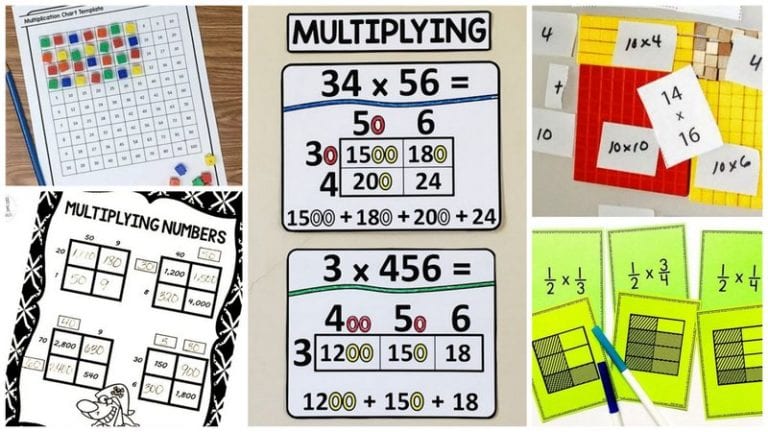The Common Core State Standards have been around for more than a decade. From the beginning, people have had, well … thoughts (I’m looking at you, parents) and it’s never really let up. If I had a nickel for every time I saw a “Common Core Math is stupid” post on social media, I would easily be able to calculate the total because so-called “Common Core Math” (also referred to as “new math” and equally derided) is actually great. No, really. From a teacher’s perspective, let me explain why Common Core Math is not the enemy.
Here’s what’s actually in the Common Core Math Standards
The most common complaint I hear is kids coming home with some “silly” method for a straightforward calculation. You might be surprised to learn that those “funny” strategies aren’t mentioned anywhere in the standards. Rather, the standards encourage students to use a variety of models and strategies to solve their problems. According to the standards themselves, “Mathematically proficient students consider the available tools when solving a mathematical problem.” More specifically, when it comes to multiplication, the fourth-grade standards state, “Depending on the numbers and the context, [students] select and accurately apply appropriate methods to estimate or mentally calculate products.”
And believe me, fluency and efficiency are the goal. What we need to accept is that the algorithm isn’t always the fastest and best method. Don’t believe me? Watch a kid work on the problem 100-97 and start to borrow. We want students who can look at that equation and reason that the answer is three, whether they’re visualizing how close 97 is to 100 on a number line or hundreds chart or thinking that seven is three away from the next 10.
We get it—most of us weren’t taught math this way
You know how they say people tend to parent the way they were parented? I think that’s really true, and I think it extends to the way parents help their kids with their schoolwork. It’s uncomfortable and stressful to try something in a new way, especially when that something (e.g., math) is already anxiety-inducing for 93% of adults.
The way most of us were taught in the “good old days” centered around the application of algorithms. Now, there’s nothing wrong with algorithms. They’re great, and many times they are the most efficient way to find an answer. The problem lies in divorcing them from meaning. (Raise your hand if you learned “When dividing fractions, don’t ask why. Just invert and multiply”?). Algorithm-only approaches are how we get students who can’t determine the reasonableness or their answers. If they’re doing double-digit multiplication and forget to “bring down the zero,” they’re going to get an incorrect answer. A student who understands the place value of the digits (e.g., in 37 x 45, that four is really a 40!) is much more likely to catch a mistake because they know their answer doesn’t make sense.
My guess is that your math education was also fairly memorization-heavy. I’m not anti-memorization. No one wants a fifth grader to use repeated addition to solve 7 x 7. They should just know that. I expect we’re all in agreement on that. But I would argue that in the first introduction the concept in the earlier grades, there’s a benefit to learning, say, arrays. Arrays are a great visual representation of what’s actually happening when you multiply. Plus, it makes it that much easier to grasp the concept area (as opposed to just learning another formula).
We’re not asking you to teach it
Here’s the thing: If you don’t understand it, we don’t want you trying to teach it to your child. That’s our job. The work that’s sent home (if it’s sent home at all—there’s growing consensus that homework isn’t all that beneficial, especially in the elementary years) is meant to be practice of a skill that’s already been taught in class. If they can’t do it by themselves, I guarantee your teacher wants to know about it. Write a note explaining what they had trouble with. I promise you your child’s teacher doesn’t want them to have a meltdown over a math strategy. As I tell my own kids, we don’t do tears over homework.
Chances are your real beef is with a badly written curriculum
If your child is getting homework that requires them to practice a particular “weird” strategy, you’re probably looking at bad curriculum. The whole idea behind Common Core Math is that, yes, you learn a variety of strategies, but also that you select the ones that work for you and the particular problem you’re trying to solve. Unfortunately, your child’s teachers are often hamstrung by district requirements that they “teach with fidelity,” meaning they can’t stray from the curriculum. Now, some teachers will buck the system for stuff that’s not in the best interests of their students, but that’s hard, and that’s where your voice comes in.
Advocate to your school board for a better curriculum. Sign up to be on the math curriculum selection committee. We need all the help we can get in adopting curricula that sets a foundation for future mathematics success. Because a kid that knows what’s really happening when you “carry the one” is going to have a much easier time as the math gets harder, and we all know it gets harder.
Common Core Math Resources for Parents
- Guide to Common Core Math for Parents
- Common Core Works Parent Roadmaps
- A Teacher’s Guide to Helping Kids with Common Core Math
- New Math: An Explainer for Millennial Parents
- 9 “New Math” Problems and Methods

